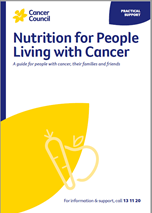Diarrhoea
Diarrhoea is when your bowel motions become loose, watery and frequent. You may also get abdominal cramping, wind and pain.
Pancreatic cancer treatments, other medicines, infections, reactions to certain foods, and anxiety can all cause diarrhoea.
If the tips listed below don’t work for you, talk to your doctor about trying anti-diarrhoea medicine.
You should also let your doctor know if your stools are pale in colour, oily, very smelly, float and are difficult to flush, or you notice an oily film floating in the toilet. This may be a sign that you do not have enough pancreatic enzymes. You may need to start pancreatic enzyme replacement therapy (PERT) or adjust your dose.
Managing diarrhoea
- Drink plenty of liquids (e.g. water, fruit juice, weak cordial) to replace lost fluids.
- Try lactose-reduced milk or soy milk if you develop a temporary intolerance to the sugar (lactose) in milk. This can sometimes occur when you have diarrhoea. Small amounts of hard cheese and yoghurt are usually okay.
- Avoid alcohol and limit caffeine and spicy foods as these can all make diarrhoea worse.
- Always let your treatment team know if you notice any changes to your bowel habits. For further support and tips, you can call the National Continence Helpline on 1800 33 00 66.
→ READ MORE: Diabetes and pancreatic cancer
Podcast: Appetite Loss and Nausea
Listen to more episodes from our podcast for people affected by cancer
Prof Lorraine Chantrill, Honorary Clinical Professor, University of Wollongong, and Head of Department, Medical Oncology, Illawarra Shoalhaven Local Health District, NSW; Karen Baker, Consumer; Michelle Denham, 13 11 20 Consultant, Cancer Council WA; Prof Anthony J Gill, Surgical Pathologist, Royal North Shore Hospital and The University of Sydney, NSW; A/Prof Koroush Haghighi, Liver, Pancreas and Upper Gastrointestinal Surgeon, Prince of Wales and St Vincent’s Hospitals, NSW; Dr Meredith Johnston, Radiation Oncologist, Liverpool and Campbelltown Hospitals, NSW; Dr Brett Knowles, Hepato-Pancreato-Biliary and General Surgeon, Royal Melbourne Hospital, Peter MacCallum Cancer Centre, and St Vincent’s Hospital, VIC; Rachael Mackie, Upper GI – Clinical Nurse Consultant, Peter MacCallum Cancer Centre, VIC; Prof Jennifer Philip, Chair of Palliative Care, University of Melbourne, and Palliative Medicine Physician, St Vincent’s Hospital, Peter MacCallum Cancer Centre and Royal Melbourne Hospital, VIC; Lucy Pollerd, Social Worker, Peter MacCallum Cancer Centre, VIC; Rose Rocca, Senior Clinical Dietitian – Upper GI, Peter MacCallum Cancer Centre, VIC; Stefanie Simnadis, Clinical Dietitian, St John of God Subiaco Hospital, WA.
View the Cancer Council NSW editorial policy.
View all publications or call 13 11 20 for free printed copies.
